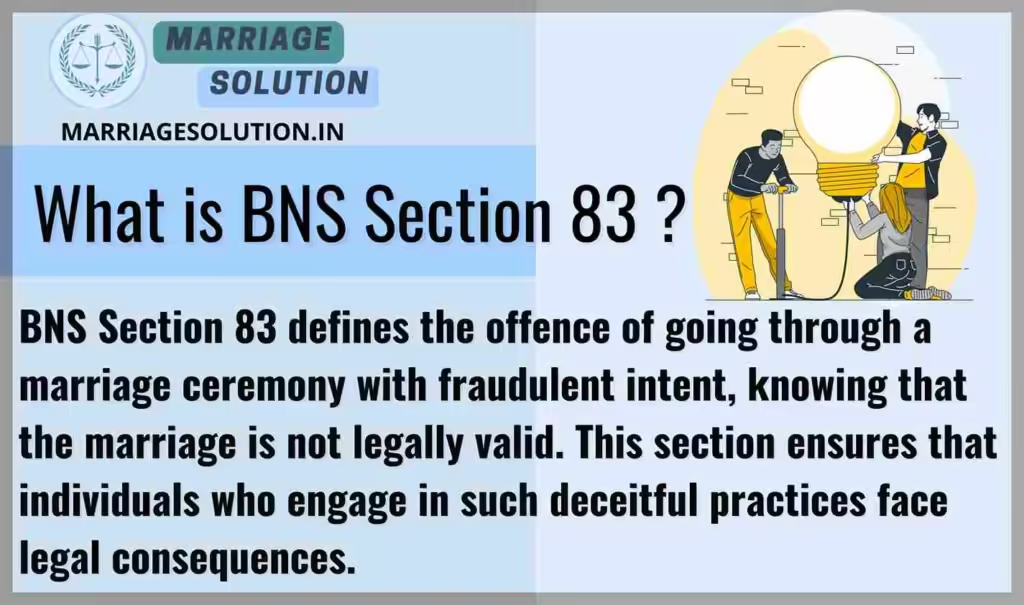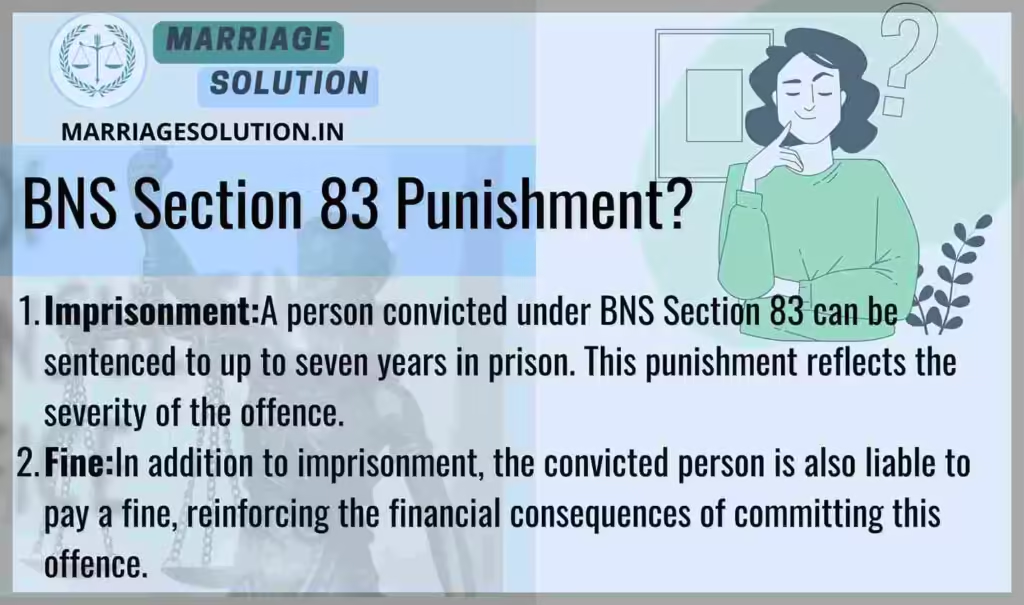Introduction of Section 83 BNS
Section 83 BNS deals with the offence of fraudulently going through a marriage ceremony without a lawful marriage. This provision ensures that people who knowingly perform a fake or invalid marriage ceremony, with the intention to deceive, are held accountable under the law. The section highlights the seriousness of marriage-related fraud, protecting individuals from being misled into believing they are legally married when they are not.
What is BNS Section 83 ?
BNS Section 83 defines the offence of going through a marriage ceremony with fraudulent intent, knowing that the marriage is not legally valid. This section ensures that individuals who engage in such deceitful practices face legal consequences.

BNS Section 83 in Simple Points
BNS Section 83 focuses on situations where a person knowingly and dishonestly goes through a marriage ceremony, even though they are fully aware that the marriage is not legally valid. This law ensures that such fraudulent acts do not go unpunished and protects individuals from being deceived into believing that a marriage is genuine.
This provision corresponds to the old IPC Section 496, now restructured under the Bharatiya Nyaya Sanhita (BNS), 2023.
1. Meaning of Section 83
Section 83 of the Bharatiya Nyaya Sanhita criminalizes the act of fraudulently going through a marriage ceremony, even when the person knows that the marriage is not legally valid. The emphasis is not on whether the marriage itself is valid or void but on the deceptive intention of the accused who participates in such a ceremony. If someone knowingly goes through marriage rituals, despite being aware that the marriage cannot be lawful, they are guilty of fraud. This provision ensures that individuals cannot misuse the formality of marriage to mislead others into believing that they are legally married.
2. Purpose of Section 83
The purpose of Section 83 is to protect the sanctity of marriage and safeguard individuals from deceitful practices. Marriage is not just a social institution but also a legal bond, and this law ensures that no one can take advantage of the ceremonial aspects of marriage to cheat others. It aims to punish those who exploit marriage rituals for wrongful gain or to mislead another person into believing in the existence of a lawful marriage. By doing so, the law also reinforces the importance of honesty and legality in matrimonial relationships.
3. Essential Ingredients of Section 83
For the offence under Section 83 to be complete, certain essential elements must be present. Firstly, there must be a marriage ceremony performed, which may involve rituals, customs, or any formal act resembling marriage. Secondly, the accused must have fraudulent or dishonest intent, meaning that the act was done with the purpose of deceiving another person. Thirdly, the accused must have knowledge that the marriage is not legally valid; for instance, they may already be married or lack the legal capacity to marry. Lastly, the conduct must result in deception of the other party, making them falsely believe that a valid marriage has taken place.
4. Punishment under Section 83
The punishment for committing an offence under Section 83 is severe because it involves both social and personal harm. A convicted person may be sentenced to imprisonment of up to seven years. Additionally, the court may impose a fine, ensuring that the punishment is both custodial and financial. This dual penalty structure ensures that offenders face not only deprivation of liberty but also monetary consequences, reflecting the seriousness of fraudulent marriages in society.
5. Examples of Section 83 in Action
To understand the application of Section 83, let us look at a few examples. Suppose a man is already married but goes through another marriage ceremony without legal divorce, fully aware that the new marriage is invalid. This act falls squarely under Section 83 as a fraudulent marriage ceremony. In another case, a person might conduct a sham marriage solely to gain property, dowry, or other benefits, knowing well that the ceremony holds no legal value. Similarly, if someone performs the rituals of marriage while concealing the fact that they are underage or otherwise ineligible, they would also be guilty under this provision. These examples highlight how the section addresses different scenarios of deception.
6. Importance of Section 83
Section 83 plays a crucial role in protecting individuals from fraudulent marital practices. It ensures that no one is misled into believing that they are lawfully married when, in fact, the marriage is invalid. By penalizing such acts, the law preserves the sanctity of marriage as both a legal and social institution. It also acts as a strong deterrent by discouraging sham marriages and penalizing those who misuse rituals for deceitful purposes. In this way, Section 83 strengthens trust in matrimonial relationships and upholds justice for victims of fraudulent marriage ceremonies.
Section 83 BNS Overview
BNS Section 83 deals with situations where a person knowingly and dishonestly goes through a marriage ceremony even though they are aware that the marriage is not legally valid. The section is designed to prevent and punish fraudulent acts in the context of marriage, ensuring that individuals do not use deceit to manipulate others into believing they are lawfully married.
Section 83 BNS Overview – 10 Key Points
1. Fraud in Marriage
This section specifically covers situations where a person pretends to marry another, even though they are fully aware that the marriage is invalid in law. Such acts are considered fraud because they create false beliefs and expectations for the victim.
2. Dishonest Intention
The offence is only established if the accused had a dishonest or deceptive intention. This means the person must have knowingly misled the victim into believing the marriage was genuine, despite knowing it was not legally valid.
3. Actual Ceremony
The law applies when the marriage ceremony is actually performed, even though it is legally void. For example, a person might go through the rituals of marriage without the legal capacity to marry, with the intention of deceiving the other party.
4. Imprisonment
A person found guilty under Section 83 can face imprisonment of up to seven years. This reflects the seriousness of marriage-related fraud, which can cause lasting emotional and social damage to the victim.
5. Fine
In addition to imprisonment, the offender may also be required to pay a fine. This financial penalty adds another layer of accountability, ensuring the punishment is both custodial and monetary.
6. Non-Cognizable Offence
The offence is classified as non-cognizable, meaning the police cannot arrest the accused without a warrant from the court. This provides a safeguard to ensure judicial oversight before any arrest is made.
7. Non-Bailable
Section 83 is a non-bailable offence, meaning the accused does not have the right to bail automatically. They must apply to the court, and bail is granted only after careful consideration by a judge.
8. Non-Compoundable
The offence is non-compoundable, which means it cannot be settled privately between the victim and the accused. Once a case is filed, it must go through the judicial process, ensuring justice is served through the courts.
9. Tried by Magistrate
Cases under this section are tried by a Magistrate of the First Class, who is a senior judicial officer with the authority to handle such serious cases. This ensures proper scrutiny of evidence and fair judgment.
10. Serious Legal Consequences
By imposing strict punishments and not allowing private settlements, the law acts as a deterrent against fraudulent marriages. It ensures that no one can exploit the sacred institution of marriage for deceitful purposes.
BNS 83 Punishment
- Imprisonment:
A person convicted under BNS Section 83 can be sentenced to up to seven years in prison. This punishment reflects the severity of the offence. - Fine:
In addition to imprisonment, the convicted person is also liable to pay a fine, reinforcing the financial consequences of committing this offence.

BNS 83 bailable or not ?
BNS Section 83 is non-bailable, which means that the accused does not have the right to be released on bail before the trial. Bail can only be granted by the court at its discretion.
Bharatiya Nyaya Sanhita Section 83
| Section | What it Means | Punishment | Bail | Cognizable? | Trial By |
|---|---|---|---|---|---|
| BNS Section 83 | When someone knowingly goes through a marriage ceremony, even though they know it is not legally valid. This is done with fraud or dishonest intent. | Jail up to 7 years + fine. | Non-Bailable (court decides on bail) | Non-Cognizable (police need court order to arrest) | Magistrate of the First Class |
| IPC Section 496 (Old) | Old law with the same meaning: a person fraudulently goes through a marriage ceremony knowing that it is not lawful, to deceive another. | Jail up to 7 years + fine (same as BNS). | Non-Bailable | Non-Cognizable | Magistrate of the First Class |
The Bharatiya Nyaya Sanhita (BNS) Section 83 replaces the old Indian Penal Code (IPC) Section 496
BNS Section 83 FAQs
What does BNS Section 83 cover?
It covers the act of dishonestly or fraudulently going through a marriage ceremony, knowing that the marriage is not legally valid.
What is the punishment under BNS Section 83?
The punishment includes imprisonment for up to seven years and a fine.
Is BNS Section 83 bailable?
No, it is a non-bailable offence, meaning the accused cannot easily secure bail before trial.
Can someone be arrested without a warrant under BNS Section 83?
No, it is a non-cognizable offence, so a warrant is required for arrest.
Who handles cases under BNS Section 83?
Cases are tried by a Magistrate of the First Class.
Is there any way to settle a case under BNS Section 83 outside of court?
No, it is a non-compoundable offence, meaning it cannot be settled outside of court.
Conclusion
BNS Section 83 plays an important role in safeguarding the sanctity of marriage. It clearly states that going through a marriage ceremony fraudulently, knowing it has no legal validity, is a punishable crime with imprisonment and fine. Since it is a non-bailable, non-compoundable, and non-cognizable offence, the law treats such deceit with utmost seriousness. By punishing fraudulent marriage ceremonies, Section 83 acts as a deterrent and ensures that no one can misuse marriage rituals for personal gain or deception.
Need Legal Support?
If you are dealing with court cases, marriage problems, or any other legal issue, our team at Marriage Solution – Lawyer Help is here for you. Simply fill out our quick online enquiry form, and we’ll connect you with the right legal expert to support your needs.
Finished with BNS 83 ? Continue exploring the next provisions of the Bharatiya Nyaya Sanhita (BNS), 2023. Each section includes explanations, examples, and plain-language breakdowns for easy understanding.
Of Offences Relating To Marriage
- Section 84 BNS : Enticing or taking away or detaining with criminal intent a married woman .
- https://marriagesolution.in/bns_section/section-84-bns/
- Section 85 BNS : Husband or relative of husband of a woman subjecting her to cruelty.
- https://marriagesolution.in/bns_section/section-85-bns/
- Section 86 BNS : Cruelty defined .
- https://marriagesolution.in/bns_section/section-86-bns/
- 87 BNS : Kidnapping, abducting or inducing woman to compel her marriage, etc .
- https://marriagesolution.in/bns_section/87-bns/
- Section 88 BNS : Causing miscarriage .
- https://marriagesolution.in/bns_section/section-88-bns/
Full IPC Section List: https://marriagesolution.in/ipc-section-list
All Indian Law & Blogs: https://marriagesolution.in/indian-law/
Full BNSS Section List: https://marriagesolution.in/bnss_section-list
